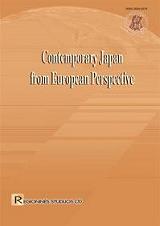Concept of Kyōsei in Tokugawa Intellectual Tradition and the Origin of Modern Company Codes
Concept of Kyōsei in Tokugawa Intellectual Tradition and the Origin of Modern Company Codes
Author(s): Jan SýkoraSubject(s): Essay|Book Review |Scientific Life
Published by: Vytauto Didžiojo Universitetas
Keywords: Japanese Neo-Confucianism; kyōsei; profit; Kaitokudō; Mijake Sekian; Kaiho Seiryō; modern company codes; japoniškasis neokonfucianizmas; kyōsei; pelnas; Kaitokudō; Mijake Sekian; Kaiho Seiryō; modernieji įmonių kodai
Summary/Abstract: The term kyōsei (共生), a concept of coexistence, has been widely applied to various disciplines from biology to business. Although it usually refers to the question of symbiosis between species, in contemporary Japanese society it has more recently become the synonymous with the concepts of corporate responsibility, ethical decision making, stakeholder maximization, and responsible reciprocity. The concept itself has, however, much longer traditional and can be traced back to the times when Confucian ideas started to penetrate Japanese intellectual milieu or even before. The Tokugawa social order brought a new framework for development of particular brand of Japanese Neo-Confucianism in which private academies like Kaitokudō, founded by the group of Osaka merchants, searched for the new concept of social relations based on the sincerity and the trust. Since the main axis of Kaitokudō thought was concerned with issues of political economy – which resulted in what Najita Tetsuo defines as a “complex discoursive interaction between a ‘political’ view of economics and an ‘economic’ view of politics” (Najita 1987: 8) – the proponents of the academy came into understanding the society as a “fabric” woven from political “warp” and economic “woof ”, stretched at the frame made of “sincerity” and “trust”. In this paper I trace the conceptual linkage between the Confucian foundation of trust and relatively modern idea of social responsibility originated in the concept of kyōsei, as discussed in Kaitokudō, Gansuidō and other private academies which emerged at the dawn of the eighteenth century, and touch the question of how the kyōsei concept was instrumental in the creation of the modern Japanese business or company codes. Kyōsei terminas, koegzistavimo sąvoka, buvo plačiai vartojamas įvairiose disciplinose – nuo biologijos iki verslo. Nors dažniausiai šiuo terminu vadinama simbiozės tarp rūšių problema, šiuolaikinėje Japonijos visuomenėje ši sąvoka tapo korporacijos atsakomybės, etinių sprendimų priėmimo, akcininkų maksimizacijos ir atsakingo bendradarbiavimo sąvokų sinonimu. Straipsnis atskleidžia konceptualų ryšį tarp pasitikėjimo sąvokos konfucianistinio pagrindo ir socialinės atsakomybės – palyginti naujos idėjos, kilusios iš kyōsei sąvokos (taip, kaip ji aptariama Kaitokudō, Gansuidō ir kitose privačiose akademijose, iškilusiose XVIII a. Pradžioje). Daugiausia dėmesio skiriama lemiamam klausimui apie tai, kaip kyōsei sąvoka pasitarnavo kuriant moderniuosius japonų verslo ir įmonių kodus.
Journal: Regioninės studijos
- Issue Year: 2009
- Issue No: 3
- Page Range: 109-119
- Page Count: 11
- Language: English

